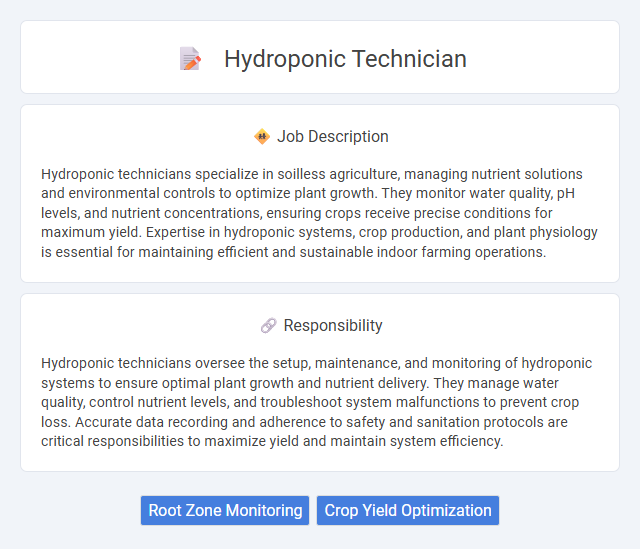
Hydroponic technicians specialize in soilless agriculture, managing nutrient solutions and environmental controls to optimize plant growth. They monitor water quality, pH levels, and nutrient concentrations, ensuring crops receive precise conditions for maximum yield. Expertise in hydroponic systems, crop production, and plant physiology is essential for maintaining efficient and sustainable indoor farming operations.
Individuals who enjoy working in controlled environments and have an interest in plant science might find a hydroponic technician role suitable. Those comfortable with hands-on tasks, monitoring nutrient levels, and troubleshooting systems may have a higher probability of success. However, people who prefer outdoor work or lack attention to detail might struggle with the demands of this job.
Qualification
A Hydroponic Technician must possess a strong background in plant biology, horticulture, or agricultural science, often supported by a relevant associate or bachelor's degree. Practical experience with hydroponic systems, nutrient management, and environmental control technologies is essential for optimizing crop growth and yield. Proficiency in monitoring plant health, using automated systems, and troubleshooting equipment failures ensures efficient operation and sustainable production in controlled environments.
Responsibility
Hydroponic technicians oversee the setup, maintenance, and monitoring of hydroponic systems to ensure optimal plant growth and nutrient delivery. They manage water quality, control nutrient levels, and troubleshoot system malfunctions to prevent crop loss. Accurate data recording and adherence to safety and sanitation protocols are critical responsibilities to maximize yield and maintain system efficiency.
Benefit
Hydroponic technician jobs likely offer benefits such as hands-on experience with innovative agricultural technology and opportunities to contribute to sustainable farming practices. Employees may experience a controlled work environment that enhances plant growth efficiency and reduces resource waste. The role probably provides career advancement potential in the growing field of urban and indoor farming industries.
Challenge
Hydroponic technician roles likely involve managing complex nutrient delivery systems and maintaining optimal growing conditions, which can be challenging due to variables such as water quality, pH balance, and disease control. Troubleshooting technical issues with automated equipment may require constant vigilance and problem-solving skills. The job probably demands adapting to rapidly changing environmental factors to ensure plant health and maximize yield.
Career Advancement
Hydroponic technicians gain specialized expertise in soil-free agriculture systems, enabling progression into roles such as agronomist, crop consultant, or farm manager. Mastery of nutrient solutions and system maintenance enhances opportunities for leadership positions within commercial hydroponic farms or research facilities. Continuous learning in plant physiology and advanced hydroponic technologies drives career growth and higher earning potential.
Key Terms
Root Zone Monitoring
Hydroponic technicians specialize in root zone monitoring to optimize nutrient delivery and ensure healthy plant development. They use sensors and data analytics to track moisture levels, pH, and oxygen concentration within the root zone, preventing root diseases and improving crop yield. Precise root environment management enhances growth efficiency in controlled hydroponic systems, making this skill essential for modern indoor farming.
Crop Yield Optimization
Hydroponic technicians specialize in optimizing crop yield through precise control of nutrient delivery, pH levels, and environmental factors such as light and temperature. They utilize advanced hydroponic systems to monitor plant health and adjust growing conditions, ensuring maximum productivity and quality. Data analysis and system calibration are key components in enhancing growth rates and reducing resource waste in hydroponic farming.
 kuljobs.com
kuljobs.com